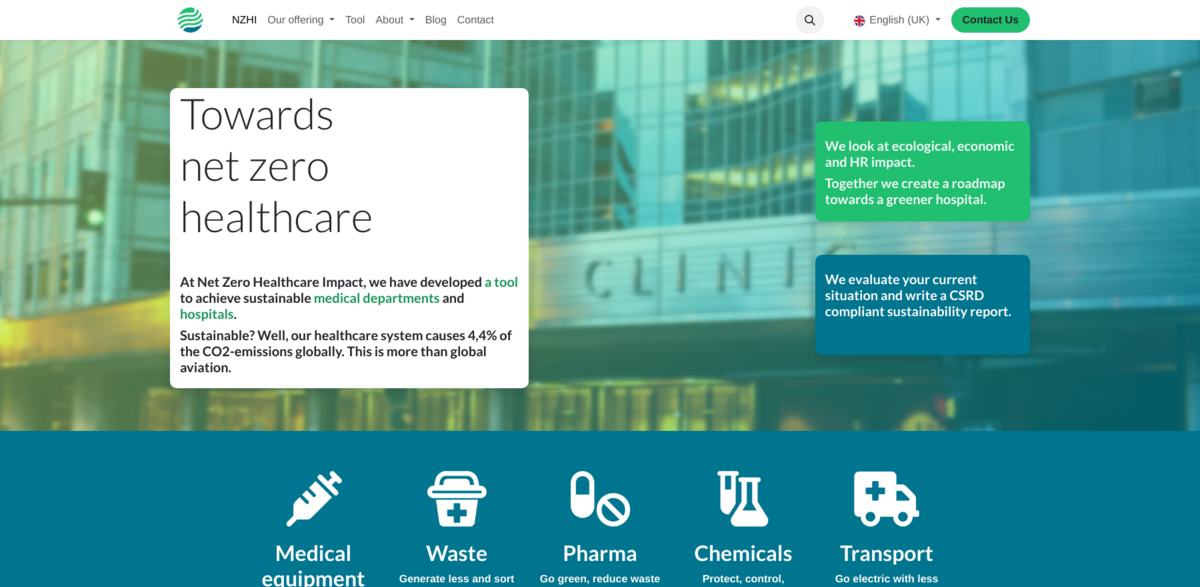What Is the Net Zero Healthcare Project?
Net Zero Healthcare Impact has developed a tool designed to help medical departments and hospitals become truly sustainable. Sustainable? Yeah, it might sound like a buzzword, but here’s the kicker: the healthcare system is responsible for 4.4% of global CO2 emissions. That’s more than the entire global aviation industry. This project isn’t just about cutting emissions; it’s about transforming healthcare into a system that cares for people and the planet at the same time.
Main Benefits and Key Facts
Here’s what makes this project stand out:
- Healthcare causes 4.4% of global CO2 emissions — more than global aviation.
- If healthcare were a country, it would rank as the fifth largest emitter worldwide.
- Models from the Lancet Countdown predict a 370% increase in heat-related deaths among people over 65 by mid-century if temperatures rise by 2°C.
- The project evaluates ecological, economic, and human resource impacts to create a comprehensive sustainability roadmap.
- It produces CSRD-compliant sustainability reports tailored to hospitals and medical departments.
Why Focus on Sustainability in Healthcare?
The World Health Organization (WHO) defines an environmentally sustainable healthcare system as one that improves, maintains, or restores health while minimizing negative environmental impacts — and even better, leveraging opportunities to restore and improve the environment. Sounds ideal, right? But let’s be honest, the current healthcare system isn’t exactly winning any awards for minimizing its carbon footprint. The reality is, healthcare’s impact on climate change is significant and growing.
The Challenge of Healthcare Waste
One of the biggest hurdles? Waste. The WHO points out that the increased use of disposable instruments and prepackaged materials has caused healthcare waste volumes to skyrocket, especially in high-income countries. This trend is alarming because it not only adds to pollution but also reflects a system that’s not yet fully embracing sustainability. Tackling this waste problem is a crucial part of moving towards net zero healthcare.
The Net Zero Healthcare Tool: How It Works
The tool developed by Net Zero Healthcare Impact focuses on ten key domains relevant to any healthcare sustainability evaluation. It’s built on solid academic research and real-world experience, combining the best insights and practices into one comprehensive approach. The tool helps hospitals and medical departments assess their current situation, then guides them step-by-step towards greener, more cost-effective operations.
Project Impact: Sustainable Development Goals (SDGs) Linked
- SDG 3: Good Health and Well-being
- SDG 7: Affordable and Clean Energy
- SDG 9: Industry, Innovation, and Infrastructure
- SDG 11: Sustainable Cities and Communities
- SDG 12: Responsible Consumption and Production
- SDG 13: Climate Action
- SDG 17: Partnerships for the Goals
Looking Ahead: The Future of Sustainable Healthcare
It’s clear that healthcare can no longer ignore its environmental footprint. With tools like the Net Zero Healthcare project, hospitals and medical departments have a real chance to lead the way in sustainability. The journey isn’t just about cutting emissions — it’s about reshaping healthcare to be more cost-aware, legally compliant, and ecologically responsible. The future? A healthcare system that truly supports the health of people and the planet, now and for generations to come.


















